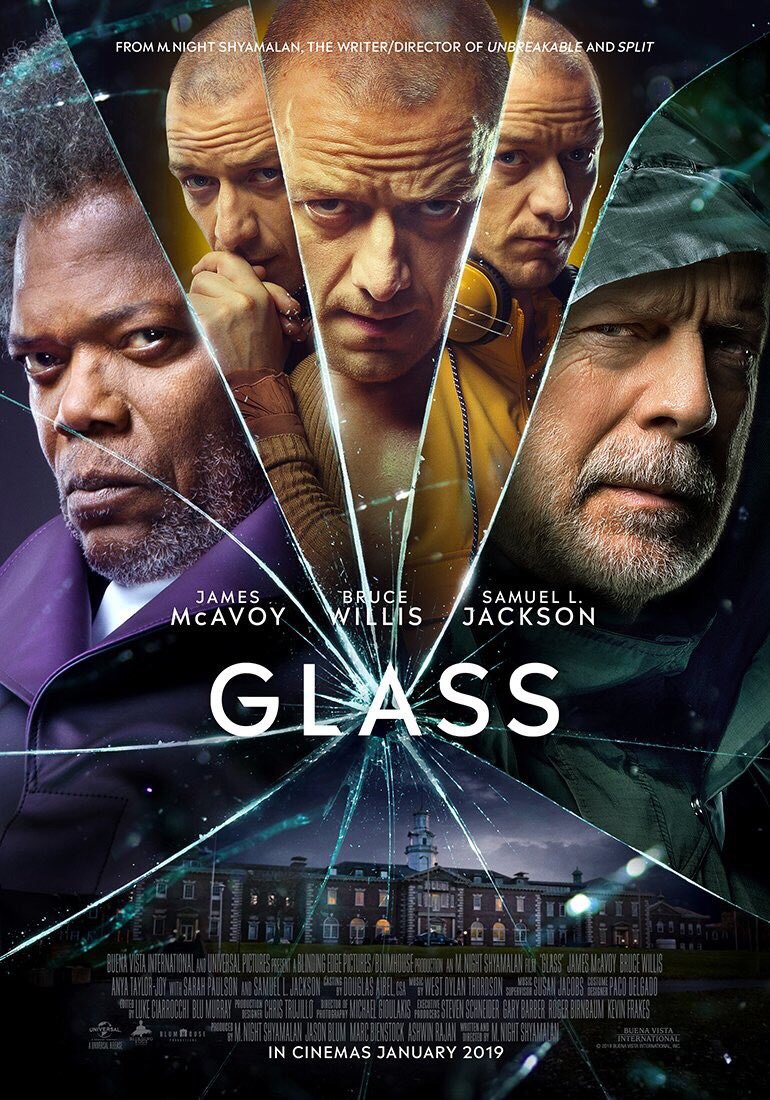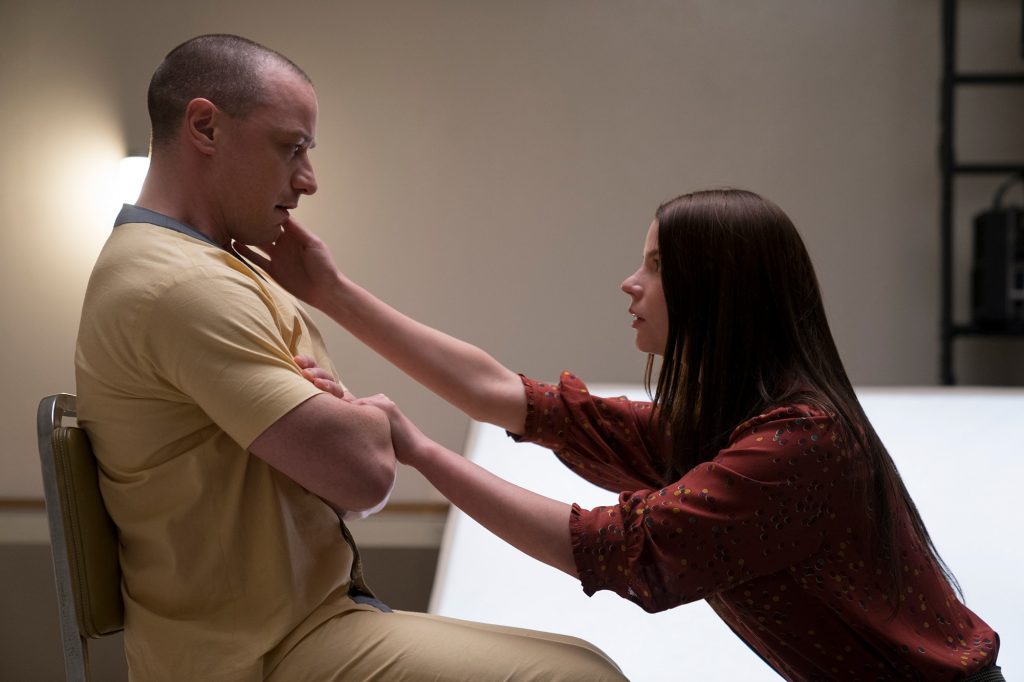
Reviewed by Tim Robins
Director M. Night Shyamalan brings together the narratives of two of his standout originals—2000’s Unbreakable, from Touchstone, and 2016’s Split, from Universal—in one explosive, all-new comic-book thriller: Glass.
Glass is another M Night Shyamalan superhero film for people who don’t like superheroes and who, much like the film’s producer-writer-director, have absolutely no understanding of the comic book medium or just comic book culture in general.
The ‘trilogy’, seemingly created only in retrospect, was inaugurated by Unbreakable, a bum numbing experience that followed the travails of David Dunn (played by Bruce Willis) as he discovers that not only have his powers, including invulnerability, allowed him to survive a train wreck, but that the wreck itself and his newly-realised identity are the work of Mr. Glass (Samuel L. Jackson), a self styled ‘super villain’ with brittle bone syndrome.
Unbreakable gained unwarranted respectability as a film that (gasp!) made superheroes seem real, which I suppose is what all superhero films aspired to, with the exception of Tim Burton’s Batman and Batman Returns which aspired to make the medium so bugged-out-crazy that superheroes couldn’t possibly exist except in some equally bugged-out-crazy alternative reality.

Like Burton’s Batman, Unbreakable worked on a Hollywood imposed narrative that heroes and their villains are linked to, and even create, each other. This might hold for Lex Luthor, who was driven to a deep hatred of Superman because, as boys, Superman rescued Luthor from a school room fire only to leave the future villain permanently bald. But turning Joe Chill, who murdered Bruce Wayne’s parents, into a young ‘Joker’ to give his conflict with Batman more dramatic depth was a tiresome Hollywood thing. As a plot device this connectivity is rare in an actual comic. Were, for instance, any of Flash’s Rogues Gallery brought into existence by ‘The Flash’?
The only level at which superheroes and super-villains are inextricably bound together is the need of the writer to tell an exciting story with both in it. It is the level of writers and their plots that Shyamalan interested in, not who caused who to fall in which vat of chemicals. If you are invested in the fates of the three “super-men”: Dunn, now ‘The Overseer’, Mr. Glass and The Horde (Spencer Treat Clarke from Split, the second in the imputed trilogy), forget it – because Shyamalan isn’t, and is more than happy to push fans eager faces in the mud.
For this reason, it is not necessary to see the preceding movies to enjoy Glass. The plot, in which the three central characters are imprisoned in a psychiatric hospital where their self belief is eroded by a not-all-that-she-seems psychiatrist, Dr Staple. (I’m sure that her name is a gag, but I wasn’t laughing).
Shyamalan is one of the main avatar’s behind ‘spoiler’ censorship, thanks to the twist ending of The Sixth Sense, a twist ending that only the extremely inattentive found surprising. (If you didn’t get it from the dinner date between Dr Malcome Crowe and his ex, then you needed to retake whatever writer’s course that you were taking). Glass has twists aplenty so I will do you a rare favour in not telling you any of them. So, I won’t be able to tell you how Samuel L Jackson takes centre stage and leaves you cheering for Mr. Glass’s elaborate plans.

I have to say that Glass is entirely watchable, not a given for Shyamalan’s films. However, it is also another example of Shyamalan po-mo nib grand standing around the relationship between authors and their world. Much like Signs , Glass worries away at the fact that, in fiction, events and characters are functions of the plot and the plot is a product of its author. Signs saw Graham Hess (Mel Gibson) looking for signs of the existence of God in the not at all coincidental chain of causes and effects that save his son from an alien attack and defeat the alien invasion of tin-plate UFOs and their occupants.
SF fans outraged at the absurdity of aliens who are vulnerable to water invading a planet whose surface is 71 per cent water missed the point, which was exactly that nothing is coincidental in movie plots; everything is predetermined by the writer. Within Shyamalan’s world, signs pass as wonders for his characters rather than mere narrative devices.
Shyamalan’s guest appearances in his own movies are not, as with Hitchcock, a bit of a laugh. Instead they are quasi-mystical events, recapitulating God’s guest appearance as Jesus. In Glass, only Mr. Glass perceives the contrived nature of his own existence. Mr. Glass spends much of the time framing events as a ‘super-villain team-up’ or his own life as a ‘limited edition’. Unfortunately, this dialogue utterly dreadful to ears of comic book readers; none of these meta-metaphors speak to the actual reality of comic books.

In fact, half way through the film, Sarah Paulson offers an account of comic-cons that is jaw droppingly nonsensical, if not totally incomprehensible. Again, this isn’t a film for comic book fans more of an adventure in auteurism for film theorists.
For me, most edge-of-the seat-tension came from wondering whether or not Shyamalan gets away with an outrageous analogy to the destruction of the World Trade Center, an event that ‘made’ heroes out of New York’s public service workers, notably members of the city’s fire brigade, and out of the passengers who may or may not have foiled the terrorists on board United 93. It is an audacious comparison with the plans of Mr. Glass, but, like it or not, audacity is what you get with Shyamalan. I’ve got a lot of time for someone who uses bathos to evoke scriptural spirituality.
I notice that Glass is being reported as an end to a trilogy. However, it is also a beginning. We are likely to face an Expanded M. Night Shyamalan Cinematic Universe.
If so, God help us all.
Tymbus
Glass is in cinemas across the UK now – online at www.glassmovie.com
A freelance journalist and Doctor Who fanzine editor since 1978, Tim Robins has written on comics, films, books and TV programmes for a wide range of publications including Starburst, Interzone, Primetime and TV Guide. His brief flirtation with comics includes ghost inking a 2000AD strip and co-writing a Doctor Who strip. He reviewed comics and films in posts and podcasts for the Mindless Ones until he became a net diva and forgot to name check the rest of the team at a San Diego Comic Con panel. The Mindless Ones gave him the nickname ‘Tymbus’
[amazon_link asins=’B00OZ0MDWY,B071NRZ48S,B001ECPV8O,B07GMPQJ53′ template=’ProductCarousel’ store=’downthetubes’ marketplace=’UK’ link_id=’0683ea7d-d1c6-403a-b469-47f773313a75′]
A freelance journalist and Doctor Who fanzine editor since 1978, Tim Robins has written on comics, films, books and TV programmes for a wide range of publications including Starburst, Interzone, Primetime and TV Guide.
His brief flirtation with comics includes ghost inking a 2000AD strip and co-writing a Doctor Who strip with Mike Collins. Since 1990 he worked at the University of Glamorgan where he was a Senior Lecturer in Cultural and Media Studies and the social sciences. Academically, he has published on the animation industry in Wales and approaches to social memory. He claims to be a card carrying member of the Politically Correct, a secret cadre bent on ruling the entire world and all human thought.
Categories: downthetubes News, Film, Other Worlds, Reviews
 In Review: MONOLiTH: AN ACE ODYSSEY by David Leach
In Review: MONOLiTH: AN ACE ODYSSEY by David Leach  In Review: The Marvels
In Review: The Marvels  In Review: Meg 2: The Trench
In Review: Meg 2: The Trench